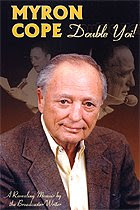
By Joe Starkey
TRIBUNE-REVIEW
Wednesday, June 22, 2005
Myron Cope most assuredly did not need a ghost writer for his 2002 autobiography, "Double Yoi!"
If you've never read Cope's prose, you'll be pleasantly surprised by what appears below. He was, in fact, one of the more accomplished sports writers of the 1960s, shortly before his accidental broadcasting career took off like Franco Harris at Three Rivers Stadium on that magical winter's day in 1972.
You could even call Cope's writing Immaculate.
Below are excerpts from two of his most-acclaimed pieces for Sports Illustrated. The first, a profile of controversial broadcaster Howard Cosell, originally appeared in the March 13, 1967 issue and later was included in SI's "50 Years of Great Writing" anthology.
Cosell was none too pleased with the piece -- until he realized it would drastically increase his notoriety.
The second story, on Pirates' great Roberto Clemente, originally appeared in SI on March 7, 1966, and later was included in "SI's Great Baseball Writing" anthology. Clemente didn't speak to Cope for about a year after the article appeared, believing it furthered his reputation as a hypochondriac.
Enjoy:
Excerpt from profile of Howard Cosell
(Originally published in the March 13, 1967 issue of SI)
''Oh, this horizontal ladder of mediocrity,'' sighs Howard Cosell, ruminating on the people who make up the radio-television industry, which pays him roughly $175,000 a year. ''There's one thing about this business: There is no place in it for talent. That's why I don't belong. I lack sufficient mediocrity.''
Cosell fondles a martini at a table in the Warwick bar, across the street from the American Broadcasting Company headquarters. Anguish clouds his homely face. His long nose and pointed ears loom over his gin in the fashion of a dive bomber swooping in with fighter escort.
''This is a terrible business,'' he says.
It being the cocktail hour, the darkened room is packed with theatrical and Madison Avenue types. A big blonde, made up like Harlow the day after a bender, dominates a nearby table, encircled by spindly, effete little men. Gentlemen in blue suits, with vests, jam the bar.
A stocky young network man pauses at Cosell's table and cheerfully asks if he might drop by Cosell's office someday soon. Cosell says certainly, whereupon the network man joins a jovial crowd at the bar.
''He just got fired,'' Cosell whispers. ''He doesn't know that I already know.''
The man, he is positive, wants his help, but what is Cosell to do when there are men getting fired every week?
''This is the roughest, toughest, cruelest jungle in the world,'' Cosell grieves.
A waiter brings him a phone, and he orders a limousine and chauffeur from a rental agency. He cannot wait to retreat to his rustic fireside in Pound Ridge up in Westchester County.
It is Monday evening, barely the beginning of another long week in which he, Howard W. Cosell, middle-aged and tiring, must stand against the tidal wave of mediocrity, armed only with his brilliance and integrity.
Excerpt from story on Roberto Clemente
(Originally published in the March 7, 1966 issue of SI)
The batting champion of the major leagues lowered himself to the pea-green carpet of this 48-foot living room and sprawled on his right side, flinging his left leg over his right leg. He wore gold Oriental pajama tops, tan slacks, battered bedroom slippers and -- for purposes of the demonstration he was conducting -- a tortured grimace.
"Like dis!" he cried, and then dug his fingers into his flesh, just above his upraised left hip.
Roberto Clemente, the Pittsburgh Pirates' marvelous rightfielder and their steadiest customer of the medical profession, was showing how he must greet each new day in his life. He has a disk in his back that insists on wandering, so when he awakens he must cross those legs, dig at the flesh and listen for the sound of the disk popping back where it belongs.
Around the room necks were craned and ears alerted for the successful conclusion of the demonstration. Clemente's wife -- the tall, beautiful Vera -- sat solemnly in a gold wing chair a few feet away. Way out in the rightfield seats, ensconced on a $1,000 velvet sofa in what may be called the Italian Provincial division of Clemente's vast living room, were his 18-year-old nephew, Pablo, and Pablo's buddy, Wilson. They sat fascinated, or at least they seemed fascinated, for it may have been that Wilson, who says his hobby is girls, was wishing that minute that Roberto would lend them his Cadillac.
"No, you cannot hear the disk now," shouted Roberto. "It is in place now. But every morning you can hear it from here to there, in the whole room. Boop!"
Boop?
Certainly, Boop.
Not only one boop but two, for there is another disk running around up in the vicinity of Roberto's neck. For that one he must have someone manipulate his neck muscles until the boop is heard.
All this herding of disks, mind you, is but a nub on the staggering list of medical attentions that Clemente has undergone during his 11 years as a Pirate.
Relatively small at 5'10" and 180 pounds when able to take nourishment, the chronic invalid has smooth skin, glistening muscles and perfect facial contours that suggest the sturdy mahogany sculpture peddled in the souvenir shops of his native Puerto Rico. His countrymen regard him as the most superb all-round big-leaguer to emerge from this island, while many Pittsburghers have concluded that the only thing that can keep Clemente from making them forget Paul Waner is a sudden attack of good health.
Joe Starkey can be reached at jstarkey@tribweb.com.


No comments:
Post a Comment